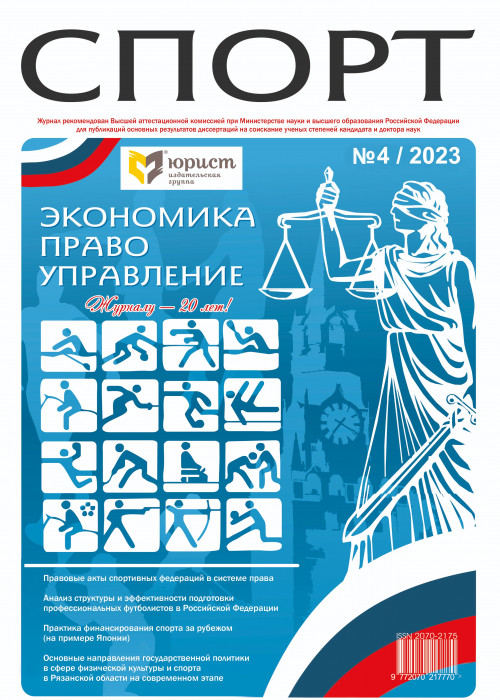Published Date: 06.12.2023
Здоровье vs результат? Проблема приоритета в фармакологической поддержке спортсменов
Annotation
Статья посвящена изучению приоритетов в использовании фармакологической поддержки спортсменов. Методология исследования, основанная на экспертных интервью с высокопоставленными представителями российского спортивного сообщества, используется для выявления факторов, влияющих на определение приоритетов в использовании фармакологической поддержки. Основной вывод статьи — фармакологическая поддержка спортсменов, нацеленная на здоровье спортсмена, может менять приоритет вследствие нарушений спортивной этики со стороны самих спортсменов и их окружения.
| Type | Article |
| Information | Sport: economy, law, management № 04/2023 |
| Pages | 25-28 |
| DOI | 10.18572/2070-2175-2023-4-25-28 |
Library
1. Вашляев Б.Ф. Педагогический аспект фармакологической поддержки в спорте / Б.Ф. Вашляев, И.Р. Вашляева, И.Н. Пушкарева, И.Ю. Сазонов // Педагогическое образование в России. 2016. № 8. С. 140–143.
2. Макарова Г. Общие и частные вопросы фармакологической поддержки спортсменов / Г. Макарова // Наука в олимпийском спорте. 2013. № 3. С. 59–64.
3. Шустов Е.Б. Общие вопросы методологии спорта высших достижений и его фармакологической поддержки / Е.Б. Шустов // Вестник Российской академии естественных наук (Санкт-Петербург). 2015. № 3. С. 108–114.
4. Aguilar-Navarro, M. Sport-specific use of doping substances: analysis of World Anti-Doping Agency doping control tests between 2014 and 2017 / M. Aguilar-Navarro [et al.] // Substance Use & Misuse. 2020. Vol. 55. Iss. 8. P. 1361–1369.
5. Barkoukis, V. Whistleblowing against doping in sport: A cross-national study on the effects of motivation and sportspersonship orientations on whistleblowing intentions / V. Barkoukis [et al.] // Journal of Sports Sciences. 2021. Vol. 39. Iss. 10. P. 1164
6. Engelberg, T. The final frontier of anti-doping: A study of athletes who have committed doping violations / T. Engelberg, S. Moston, J. Skinner // Sport Management Review. 2015. Vol. 18. Iss. 2. P. 268–279.
7. Green, M. Changing Policy Priorities for Sport in England: The Emergence of Elite Sport Development as a Key Policy Concern / M. Green // Leisure Studies. 2004. Vol. 23. Iss. 4. P. 365–385.
8. Houlihan, B. Public opinion in Japan and the UK on issues of fairness and integrity in sport: Implications for anti-doping policy / Houlihan B. [et al.] // International Journal of Sport Policy and Politics. 2020. Vol. 12. Iss. 1. P. 1–24.
9. Houlihan, B. The World Anti-Doping Agency at 20: progress and challenges / B. Houlihan [et al.] // International Journal of Sport Policy and Politics. 2019. Vol. 11. Iss. 2. P. 193–201.
10. Jedlicka, S. The normative discourse of anti-doping policy / S. Jedlicka // International journal of sport policy and politics. 2014. Vol. 6. Iss. 3. P. 429–442.
11. Krieger, J. Sex, drugs and science: the IOC’s and IAAF’s attempts to control fairness in sport / J. Krieger, L. Parks Pieper, I. Ritchie // Sport in Society. 2019. Vol. 22. Iss. 9. P. 1555–1573.
12. Møller, V. Anti-doping — the end of sport / V. Møller, P. Dimeo // International journal of sport policy and politics. 2014. Vol. 6. Iss. 2. P. 259–272.
13. Ritchie, I. Pierre de Coubertin, Doped ‘Amateurs' and the ‘Spirit of Sport': The Role of Mythology in Olympic Anti-Doping Policies / I. Ritchie // A Global History of Doping in Sport. Routledge, 2016. P. 6–24.
14. Thibault, L. Globalization of sport: An inconvenient truth / L. Thibault // Journal of sport management. 2009. Vol. 23. Iss. 1. P. 1–20.
Get access to the article
